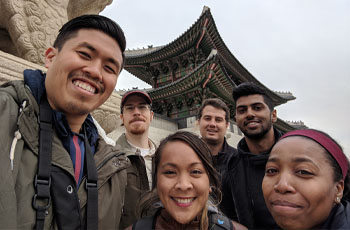About Teaching English in South Korea
To teach English in South Korea, most teachers will need a TEFL certificate and a 4-year college degree. You must be a native English speaker too. The average salary for teaching English in South Korea is $1,850 - $2,650 USD per month. Housing and airfare are typically provided.
ITA's South Korea Insights
| Degree | Cost of Living | Types of Jobs |
Salary Range |
Savings Potential |
| BA/BS Required | $650-$900 USD per month | Public or Private Schools (Hagwons), Business English | $1850-$2650 USD p/m, plus free housing | Save up to $1200-$1600 per month |
- English is first taught in elementary school in South Korea and can begin in kindergarten.
- Government programs like EPIK provide a multitude of opportunities for prospective teachers.
- Speaking English is still a desired skill for children and job seekers, and Korea has even introduced English-medium education at universities, according to the British Council.
- Korea is hoping to increase the amount of South Korean college students studying abroad in English-speaking programs.
The job market for teaching English in South Korea is currently one of the largest and strongest in the world. Those looking to teach English in Korea can find teaching opportunities year-round, and interviews are conducted in advance over the phone and via Zoom. In most cases, those teaching English in Korea receive free or reimbursed airfare, and South Korean schools typically provide free housing. A typical contract for an English teacher in Korea offers a free return flight, paid vacation and a 1-month salary bonus (around $ 2,000 USD after 12 months).
 |
 |
The capital, Seoul, is one of the largest and most cosmopolitan cities in the world with approximately 25 million people and over 1,000 English language schools. There are an estimated 25,000 English teachers in South Korea working each year and demand shows no signs of slowing. Many English teachers in South Korea work in major government public school programs while others teach in private schools known as hagwons.
Other major cities for teaching English in South Korea include Seoul, Busan, Incheon, Ulsan, Gwangju, Daejeon, and Daegu.
For those looking to get TEFL certified onsite in South Korea, International TEFL Academy offers a course in Incheon.







 Founded in 2010, International TEFL Academy (ITA) is a world leader in TEFL certification for teaching English abroad and teaching English online. ITA offers accredited TEFL certification classes online and in 20+ locations worldwide and has received multiple awards and widespread recognition as one of the best TEFL schools in the world. ITA provides all students and graduates with lifetime job search guidance and has certified more than 40,000 English teachers. Our graduates are currently teaching in 80 countries worldwide.
Founded in 2010, International TEFL Academy (ITA) is a world leader in TEFL certification for teaching English abroad and teaching English online. ITA offers accredited TEFL certification classes online and in 20+ locations worldwide and has received multiple awards and widespread recognition as one of the best TEFL schools in the world. ITA provides all students and graduates with lifetime job search guidance and has certified more than 40,000 English teachers. Our graduates are currently teaching in 80 countries worldwide.








